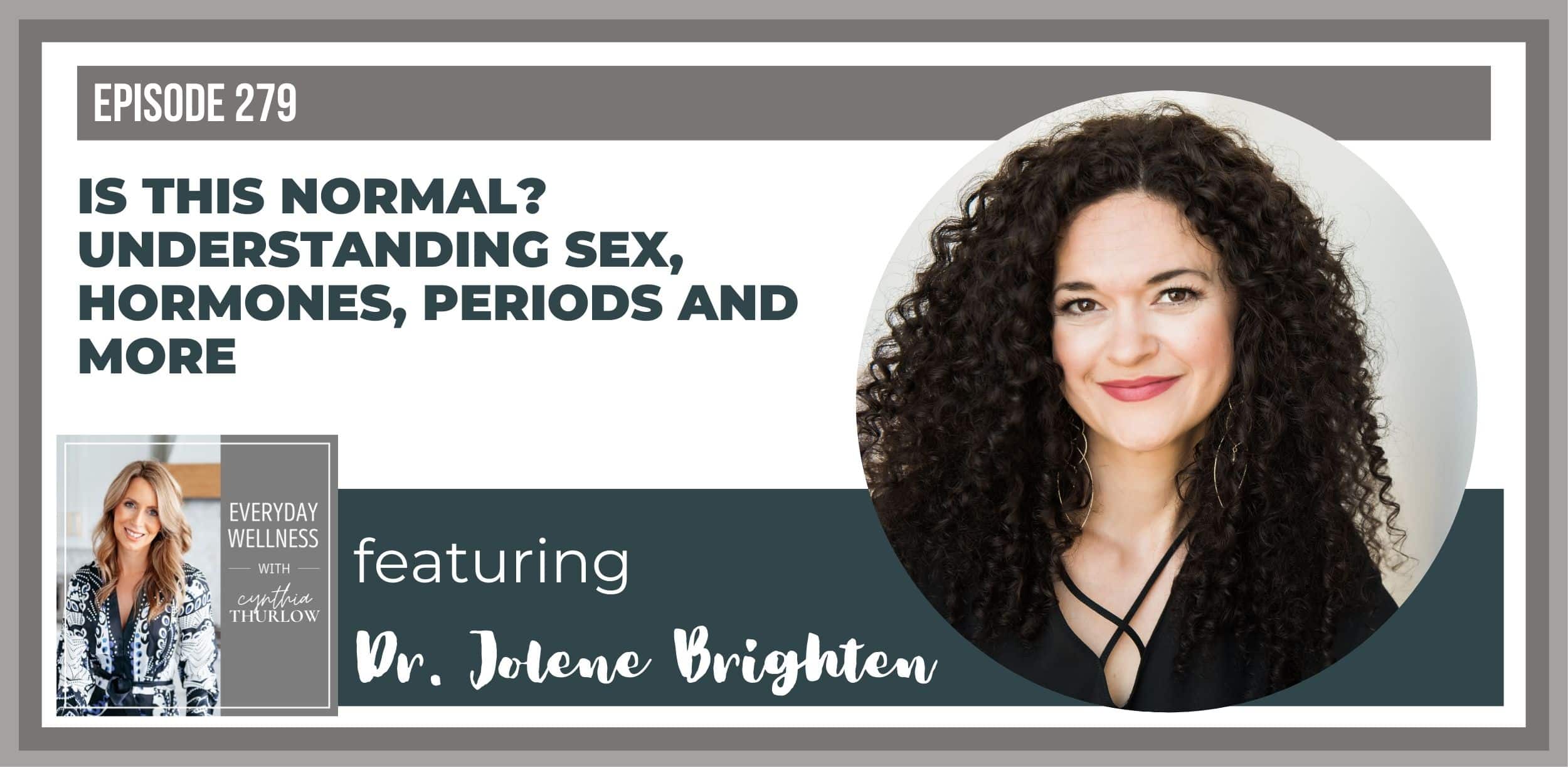Summary of Ep. 279 Is this Normal? Understanding Sex, Hormones, Periods and More with Dr. Jolene Brighten:
*Summary bullet points:
1. The importance of open and honest conversations about sexuality and the impact of shame on women’s libido and sexuality.
2. The need for consent to be included in sex education.
3. The effects of coming off oral contraceptives and the significance of lifestyle choices on hormones.
4. The mind-body connection and how hormones and menopause influence women’s sexuality.
5. The impact of lifestyle choices in our 20s and 30s on transitioning into perimenopause.
6. The role of detoxification and avoiding endocrine disruptors in hormone balance.
7. Differentiating between PMS and PMDD.
In a world where discussions about human sexuality often remain taboo, I had the privilege of conversing with renowned hormone expert and women’s medicine advocate, Dr. Jolene Brighten. With her recently published book, Is This Normal, Dr. Brighten offers a non-judgmental guide to understanding hormone balance, eliminating unwanted symptoms, and nurturing our sexual desires. In our compelling discussion, we explored various topics, including the impact of shame on women’s libido, the importance of consent in sex education, the effects of coming off oral contraceptives, and the role of lifestyle choices in hormone health.
One of the primary factors hindering open conversations about sexuality is the pervasive sense of shame associated with it. Women often feel ashamed of their desires and are burdened with unrealistic expectations of willpower and self-control. Dr. Brighten emphasizes the need to eliminate shame and promote a healthy understanding of natural urges and desires. By shifting the cultural narrative, we can empower women to embrace their sexuality without judgment.
Another crucial aspect that Dr. Brighten discusses is the inclusion of consent in sex education. By educating individuals about the importance of consent from a young age, we can foster a culture of respect and autonomy in sexual relationships. Understanding and practicing consent is fundamental to healthy and fulfilling sexual experiences for all.
The conversation also delves into the effects of oral contraceptives on women’s health. Dr. Brighten highlights the significant impact that hormonal birth control can have on our bodies and emphasizes the need for informed choices. Coming off oral contraceptives can disrupt hormone levels, leading to a range of symptoms such as mood swings, irregular periods, and decreased libido. By considering alternative methods of contraception and adopting a holistic approach to hormone health, we can optimize our well-being.
Our choices and lifestyle habits play a crucial role in hormone balance, both in the present and future. Everything we do in our 20s and 30s can influence our transition into perimenopause and beyond. Dr. Brighten emphasizes the significance of making healthy choices, such as a balanced diet, regular exercise, and stress management, to support hormonal health and well-being throughout our lives. By being proactive in our younger years, we can pave the way for a smoother hormonal transition in later stages of life.
Detoxification is another essential aspect of hormone health that Dr. Brighten discusses. Our bodies are bombarded with endocrine disruptors, substances that interfere with the normal functioning of hormones. These disruptors can be found in everyday items such as plastics, cleaning products, and personal care items. Dr. Brighten introduces her 28-day detox program, which aims to support the body’s natural detoxification processes and reduce exposure to these harmful substances. By minimizing our contact with endocrine disruptors, we can better protect our hormone balance and overall health.
The conversation also touches on the differentiation between premenstrual syndrome (PMS) and premenstrual dysphoric disorder (PMDD). While PMS is a common occurrence that affects many women, PMDD is a more severe form of PMS characterized by extreme mood swings, depression, and anxiety. Dr. Brighten highlights the importance of recognizing the symptoms and seeking proper help and support for those experiencing PMDD. With appropriate treatment, women can find relief and regain control over their lives.
In conclusion, my conversation with Dr. Jolene Brighten has shed light on the fascinating and often misunderstood aspects of women’s sexuality and hormone health. By breaking the silence around these topics, we can empower ourselves with knowledge and make informed choices to nurture our well-being. Let us embrace open conversations, eliminate shame, and prioritize consent in sex education. By considering the impacts of oral contraceptives, making healthy choices in our younger years, supporting detoxification, and differentiating between PMS and PMDD, we can navigate the complexities of hormone balance with confidence and grace. Together, let us embark on this journey of understanding our bodies and reclaiming the power of our hormones.


